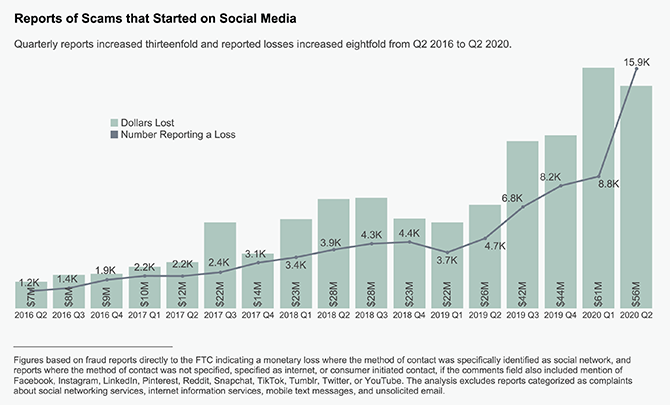21 Oct Facebook Ads Documented by FTC as Promoting Scams via @martinibuster
The United States Federal Trade Commission (FTC) reported that their documented consumer scam complaints related to social media are rising at unprecedented levels. Consumers have lost $117 million dollars in the first six months of 2020 compared to $134 million dollars for 2019.
The FTC describes the Facebook ad scam trend as skyrocketing.
Scams Trending at Remarkable Pace
 Social media related scams are skyrocketing at a seemingly out of control pace.
Social media related scams are skyrocketing at a seemingly out of control pace.
Facebook and Instagram Ads Used by Scammers
Facebook and Instagram advertising is being abused by criminals to swindle users out of millions of dollars in 2020. Online shopping related to Facebook advertising is cited by nearly 100% of consumers who report having placed an order and never received their items.
What’s happening is that swindlers are placing ads on Facebook with no intention of delivering products.
The FTC highlighted the danger of online shopping via Facebook ads by stating that the top consumer complaints about being scammed was through online shopping via Facebook and Instagram advertising.
According to the FTC
“Online shopping topped the list of complaints from consumers who reported a scam to the FTC that originated on social media.
Of these consumers, many were responding to an ad they saw on social media and reported that the item they ordered never arrived.
Most of those consumers (94 percent) who identified the social media service in their complaint cited Facebook or Instagram as the platform they used.”
The FTC specifically named Facebook and Instagram advertising as usually being the source of advertising related scams.
The government watchdog said that criminals are abusing advertising features to make their ads look more trustworthy.
“These scam ads look real and can be carefully targeted to reach a particular audience. The scammers can delete comments on their ads or posts, so that negative responses don’t show up and alert people to the con.”
Romance Scams
But it’s not just shopping ads that criminals are using. Romance related rip offs are also reported, accounting for millions of lost dollars.
The FTC warns:
“About half of all romance scam reports to the FTC since 2019 involve social media, usually on Facebook or Instagram.”
Romance related scams, according to the FTC, begin with a message or a friend request. The FTC encourages the public to not send money to a love interest that they have not met.
Types of Scams Found on Facebook Ads
- Online Shopping
- Romance scams
- Economic relief scams
- Income opportunity scams
- Grant money
- Giveaways
- Multi-level marketing MLM
- Pyramid schemes
- Blessing circles/gifting schemes
Facebook Scammers Using Identity Theft Schemes
Another way scammers are taking advantage of users is by impersonating a Facebook member or by outright taking over an account. Scammers are taking advantage of the fact that Facebook users will trust messages from someone they know and trust.
Finance Related Scams
The FTC said that the pandemic has created an opportunity for scammers to use Facebook advertising to reach economically distressed consumers to scam millions of dollars.
Many people are looking for ways to earn more money. Scammers are taking advantage of them with pyramid and MLM schemes.
Facebook Ad Scams Create a Bad Impression
Scammers leveraging Facebook ads is bad for consumers and for legitimate advertisers. Millions of dollars have been lost and the victims will tell a friend about their experience.
The success of advertising depends on trust. Anything that erodes trust in Facebook advertising can’t be good for the advertising ecosystem.
Citation
Read the official FTC report:
Sorry, the comment form is closed at this time.